Music Festival Review: The Newport Jazz Festival at 70 — Bridging Generations and Styles
By Paul Robicheau
Despite the charges of some purists, jazz was alive in the hands of a few veterans at Newport Jazz 2024, as well as newcomers sharing their own voices in the tradition.
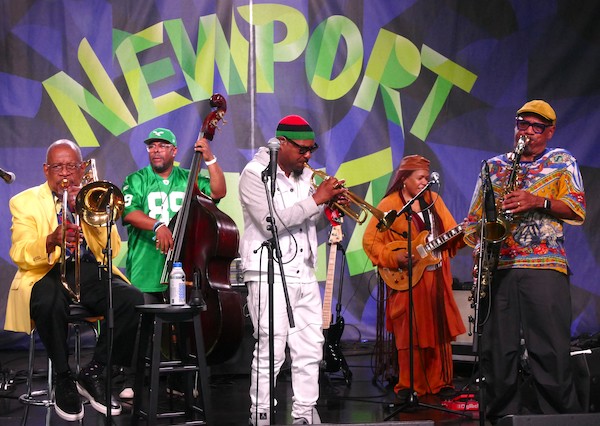
Christian McBride’s Jam Jawn at Newport Jazz 2024. Photo: Paul Robicheau
The Newport Jazz Festival marked its 70th anniversary this past weekend by bridging generations and styles, from bebop and fusion to R&B, hip-hop, and Afrofuturism, alluding to its past and future. It also offered a less-crowded, more-chill environment at Fort Adams State Park than its five-years-younger cousin Newport Folk did a week earlier, though both festivals were sold out.
Some jazz purists may have been disappointed by Newport Jazz’s tilt to DJs and rappers and popular artists like Elvis Costello, Brittany Howard (who spun a variation on her stirring Newport Folk set), lovelorn songstress Laufey and disco pioneers Niles Rodgers & Chic. However, more than any shortage of jazz in the program, a bigger question could be why draws such as Kamasi Washington, Robert Glasper, and Samara Joy — as great as they are — get invited back seemingly every year rather than spreading the wealth to other artists? In any case, jazz was alive in the hands of a few veterans at Newport Jazz 2024, as well as newcomers sharing their own voices in the tradition.
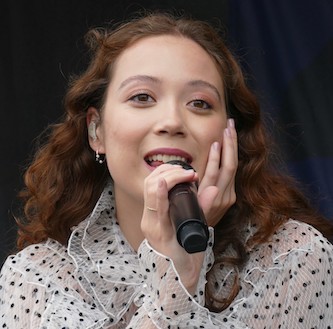
Laufey at Newport Jazz 2024. Photo: Paul Robicheau
Tributes to late old-school giants began each day on the Fort main stage, first on Friday with the colorful, space-placed big band the Sun Ra Arkestra (alas, without sax sage Marshall Allen, who has amazingly still been performing at age 100) and on Saturday with Legacy of Wayne Shorter. That group featured half of the saxophonist/composer’s keen millennial quartet with pianist Danilo Perez and bassist John Patitucci, plus drummer Terri Lyne Carrington (another Shorter alum) and sax stand-in Ravi Coltrane. Underrated in the shadow of his legendary father John, Coltrane lent steady energy — from buttery tenor flurries in “Niyako” to spiraling soprano in a rhythmically probing “Joy Ryder,” though the other group members steadily left space for each other in the compositions. Perez also debuted a new synthesizer that hinted at Shorter’s ’70s band Weather Report.
Sunday’s Fort-opening Newport at 70 unveiled a group of younger jazz players led by bold saxophonist Nicole Glover, also of Saturday’s all-woman Artemis, which deftly navigated a succession of smart arrangements. Newport 70 paid tribute to jazz greats from Thelonious Monk (“Epistrophy”) to Abbey Lincoln, whose apt “Long Is Your Living” was highlighted by guest singer Jazzmeia Horn, who also nodded to bebop with syncopated scatting. Traditional jazz also earned a fresh airing from young local musicians billed as Sunday Jazz on the same main stage.
Jazz veterans were scarce in the lineup beyond combos led by pianist Kenny Barron and bassist Buster Williams. Electric/acoustic bass pioneer Stanley Clarke fulfilled fusion hopes by tearing into Return to Forever’s “Hymn of the 7th Galaxy” with his flashy N-4ever band, oozing Charles Mingus’s “Goodbye Pork Pie Hat,” and adding a late drumming cameo by his former RTF mate Lenny White. Yet the next generation was well represented by drummer Johnathan Blake’s Pentad, powered by saxophonist Immanuel Wilkins, and Anat Cohen’s Quartet, which featured her clarinet unwinding relentless spools of joy.
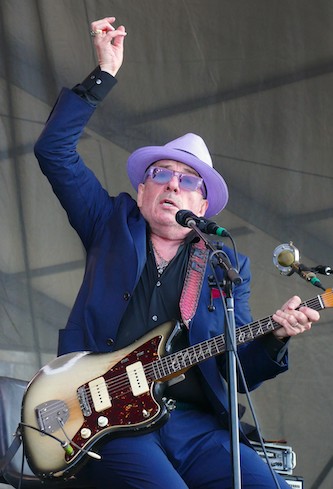
Elvis Costello at Newport Jazz 2024. Photo: Paul Robicheau
Singers as well as instrumentalists were plentiful across styles and genres at this year’s fest as well. Samara Joy — who climbed to main-stage billing over three years with a Best New Artist Grammy along the way — shined in the role of traditional jazz vocalist. Befitting the moment, she eased into standard “You Stepped Out of a Dream,” surged into waves of high notes over the orchestral cushion of a four-man horn section in a medley of her “Piece of Mind” and Sun Ra’s “Dreams Come True,” and gave a deep, ghostly scat to Billie Holiday’s “Left Alone.”
As Joy caressed the curves in her lyrics, a faulty sound mix caused some notes to cut out like they were lost in a gust of wind. And, while a vocal talent like Joy could blow beyond glitches, the same couldn’t be said for genre-curious rocker Elvis Costello, who faced the daunting task of following her. It didn’t help that he attempted to put across a more esoteric set (rehearsed at Boston’s Q Division Studios) with a drummer-less combo that included longtime bandmate Steve Nieve on piano, three horns centered by Donny McCaslin (Maria Schneider Orchestra, David Bowie), and a DJ for beats. Costello awkwardly moved from a dragged-reggae “Watching the Detectives” to a beat-infused “Come The Meantimes” (the gesticulating singer suggesting a hip carnival barker), to the slow acoustic-guitar tango “I Do (Zula’s Song),” where he threw in some Spanish — though his vocal was too soft to be heard. And when Costello moved to piano to croon “The Poisoned Rose,” his voice was simply ragged, pointing up his recurring decline as a singer in recent years.
The opposite proved true for English R&B-pop singer Lianne La Havas, whose solo turn was transfixing. She showcased the range of her supple voice over the hypnotic weave of her electric guitar in originals “Courage” and “Midnight.” For other songs, like her contrapuntal distillation of Radiohead’s “Weird Fishes,” she was joined by keyboardist Julius Rodriguez. One of the festival’s most impressive newcomers, he also performed with his own band, shifting from keytar fusion to New Orleans groove and soundtrack-like sophistication at the piano. Likewise, Brazilian jazz pianist Amaro Freitas wowed with his kinetic and lyrical playing as the focal point of his own trio.
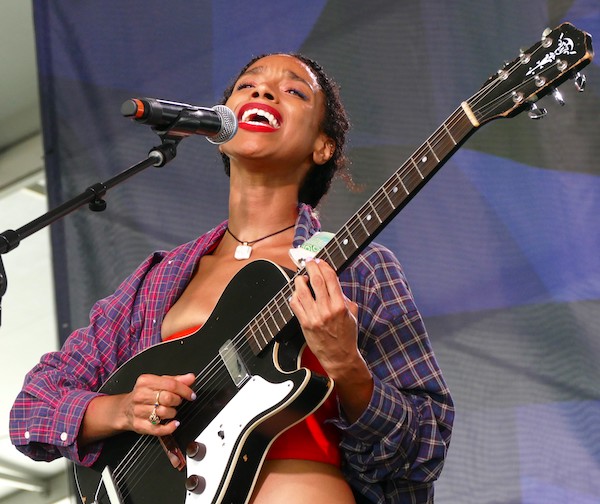
Lianne La Havas at Newport Jazz 2024. Photo: Paul Robicheau
“Meshell Ndegeocello is a band” read the T-shirt of another R&B-pop singer who confounds expectations, and she indeed put the focus on her group as they introduced material from new album No More Water, inspired by writer James Baldwin. It was an impressionistic affair where Justin Hicks handled lead vocals (often in soulful falsetto), though — unlike a Boston date last year — Ndegeocello put bass guitar aside for a spoken-word piece.
More outwardly accessible, crossing her R&B roots with a love for jazz singers like Carmen McRae and Betty Carter, singer Alex Isley (whose father Ernie was a member of the Isley Brothers) radiated warmth at the smallest Harbor stage, recognizing the setting. “This is sacred ground,” she said, and worked to meet it.
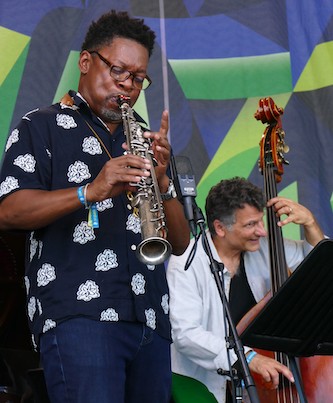
Ravi Coltrane and John Patitucci in Legacy of Wayne Shorter at Newport Jazz 2024. Photo: Paul Robicheau
Perhaps the least “jazz” of the weekend’s singers was also the most popular, at least with a younger crowd. The Icelandic upstart Laufey hit the stage in a flowing, ruffled dress worthy of a Disney princess. There was no denying the sweet-voiced romantic’s talent as she moved from guitar to cello (including a solo break in “I Wish You Love”) to piano for her mid-afternoon Sunday set. But, despite her precious, string-swelled refractions of jazz and classical music, her voice and songs about relationships lacked variation in tone and subject matter, despite standouts like “Promise” and the bossa nova “Falling Behind.”
Hip-hop culture made its own disparate inroads into Newport Jazz, from the activist Chicago rapper Noname (who dealt quick-tongued verse after failing to freestyle because of her drummer’s initial technical issues) to crowd-rousing Seattle rapper/drummer Kassa Overall to the charismatic Cimafunk, who led an eight-piece band through a spirited mix of Cuban music, hip-hop, and funk. Likewise, the mid-sized Quad stage had chairs ditched for a second weekend to accommodate the good-time grooves of Acid Jazz Is Dead (records spun by DJs Adrian Younge and A Tribe Called Quest’s Ali Shaheed Muhammad) and the live, expanded ensemble Thievery Corporation, which blended acid jazz, dub reggae, and hip-hop with music from Brazil, India, and the Middle East.
At the other end of the spectrum, Andre 3000 (once rapper of popular Atlanta hip-hop duo OutKast) and Shabaka Hutchings (once leader of polyrhythmic stompers Sons of Kemet and jazz-funk-electronica mashers the Comet Is Coming) opted for meditative flute work with respective trios at Newport.
Collaborations fueled the particularly strong sets that began and ended Sunday’s Quad lineup. Punk-jazz trio the Messthetics combines bassist Joe Lally and drummer Brendan Canty of the post-hardcore band Fugazi with experimental-minded guitarist Anthony Pirog. But they teamed up with tenor-sax firebrand James Brandon Lewis for their latest album. While the addition turned the quartet to more straightforward jazz, it was Lewis — a rising star on his own behind his latest work — that gave the melody-trading group visceral power at Newport with his sheets-of-sound intensity. Pirog’s glassy voicings were a bit lost in the mix. And to close out the Quad, bassist and artistic director Christian McBride went for accessible, funky old-school fun with the latest edition of his Jam Jawn, featuring James Brown trombonist Fred Wesley, new Rolling Stones drummer Steve Jordan, trumpeter Russell Gunn, saxophonist Kirk Whalum, guitarist Felicia Collins, and keyboardist Christian Sands. Eventually they were joined by singer Dianne Reeves.
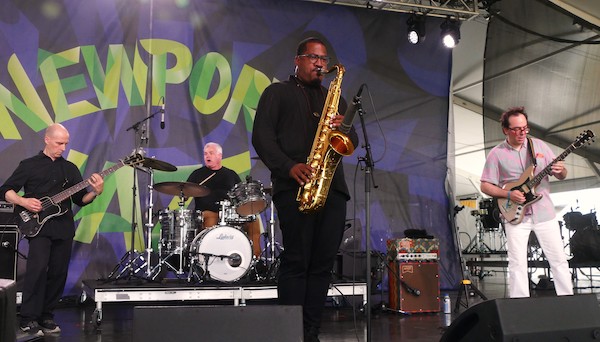
The Messthetics with James Brandon Lewis at Newport Jazz 2024. Photo: Paul Robicheau
But Saturday headliner Dinner Party centered the festival, bringing together Terrace Martin, Robert Glasper, and Kamasi Washington, who all performed with their own bands across the three days. That led to some redundancy in style and musician lineups, but if fans were expecting the hip-hop echoes of smooth jazz that Dinner Party leans toward on record, they were given a good jolt. It wasn’t long before new sax titan Washington unleashed one of his volcanic peaks on tenor in addition to pairing off with Martin’s alto. Isaiah Sharkey added a scorching guitar solo. Glasper amassed clusters in a later electric-piano break and shared vocals with Martin, though the group also sampled vocals from associate Thundercat’s grooving “Them Changes.” And an interpretation of Radiohead’s dreamy “Everything in Its Right Place” beautifully underscored the sunset.
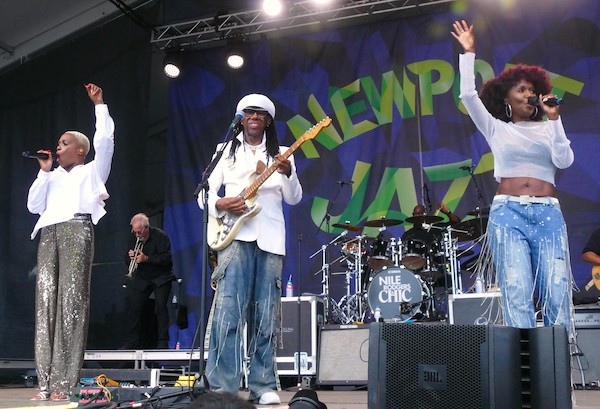
Nile Rodgers & Chic at Newport Jazz 2024. Photo: Paul Robicheau
Sunday’s finale was iffier because of the weekend’s first possible thunderstorm. But Niles Rodgers cried “We came to dance, party, and have a good time,” and the guitarist/producer and his band Chic wasted no time planting their disco-era flag in the soil of Newport Jazz with “Le Freak,” “Everybody Dance,” and “I Want Your Love.” Flanked by singers Kimberly Davis and Audrey Martells, Rodgers then fired up a medley of other hits he was involved with, including Diana Ross’s “I’m Coming Out,” Sister Sledge’s “We Are Family,” Daft Punk’s “Get Lucky,” and David Bowie’s “Let’s Dance.” By the time the festival called a slightly early end to the proceedings, the jazz crowd was long gone and remaining Chic fans had pretty much gotten their fill as well.
Paul Robicheau served more than 20 years as contributing editor for music at the Improper Bostonian in addition to writing and photography for the Boston Globe, Rolling Stone, and many other publications. He was also the founding arts editor of Boston Metro.
Tagged: Christian McBride, Elvis Costello, Jam Jawn, James Brandon Lewis, John Patitucci, Laufey, Lianne La Havas, Messthetics, Nile Rodgers & Chic, Noname, Ravi Coltrane
